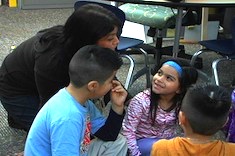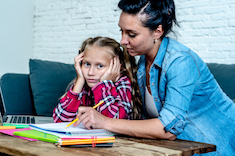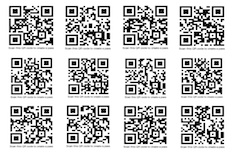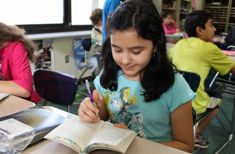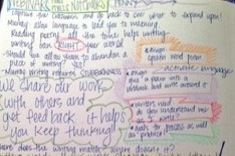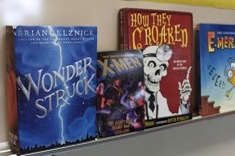Family Relations
Families come in many forms. A good rapport with parents, siblings, and grandparents can make all the difference in building a classroom and school community. Here are some creative suggestions for reaching out to families through conferences, special events, and volunteer opportunities. Our contributors also share the challenges of communicating with parents, and what they've learned when they've failed to connect.
Latest Content
Say Cheese: Sharing Photos to Increase Family and Student Engagement
Most teachers have, at some point, taken a picture of their class or a particular student and shared that photo with a family, but what if teachers became more intentional about taking and sending pictures? Tiffany Abbott Fuller gives practical ideas for using photos to increase family engagement.
The Power of Story
Becca Burk reminds us of the power of story and community when she uses a social story to help a kindergartner overcome the fear and anxiety from being forgotten on the bus. Becca shows us how to use a social story to develop confidence to overcome difficulties.
Partnering with Families on Reading
Tara Barnett and Kate Mills share ways to make families partners in the pursuit of creating lifelong readers. They share research that makes a case for “just” reading and compelling suggestions for families to support their children’s reading lives.
QuickTake: Grading Student Writing
Ruth Ayres shares a process for grading student writing that improves efficiency and accuracy.
Rethinking Parent-Teacher Conferences: Centering the Humanity of Students in All Discourses
Stella Villalba offers five compelling tips to making parent-teacher conference conversations more joyful, useful, and hopeful.
Six Tips to Plan a Family Literacy Night
Does planning a family literacy night seem overwhelming? Lisa Mazinas offers six tips to ensure a thoughtful and successful event.
QuickTake: Chronicling Learning All Year
Tammy Mulligan shares a beginning-of-the-year routine where second graders create an identity frame. This becomes a place to highlight photographs of their learning each week throughout the school year.
Keeping Parent Communication Open in Middle School
Tara Barnett and Kate Mills find that they have to change the way they think about connecting with families once students reach middle school.
A Homework-Free Classroom
Dana Murphy looks at homework from the twin perspectives of mom and teacher, and finds she hates it from both views.
Summer Literacy
“What can I do to help my son and daughter stay sharp and not lose momentum during the summer?” When a parent asks this question, Mark Levine offers his Top Six Summer Slide Preventers.
Unadulterated Reading
Just reading. Pure, unadulterated reading. That’s the reading homework that matters most in the long run. Stephanie Affinito explains why.
Conferences with Parents of English Language Learners
Jen Schwanke and Stella Villalba share practical tips for conferring with parents of English language learners.
Conferences Between Middle School Parents and Teachers
Parents of middle school students are often bewildered at how best to deal with their child’s unresponsiveness. Jennifer Schwanke explains how teachers can construct conferences with middle school parents that foster reflection, action, and shared goals.
Ohana Means “Family”
Suzy Kaback is startled to see a picture of her deceased father on the wall when she visits her daughter’s seventh-grade classroom. It’s the start of learning about the power of ohana in schools.
One Child, Many Stories
Asking the right questions of family members can get you far more valuable information than anything from an assessment, especially when you are dealing with English language learners. Stella Villalba explains why initial meetings with new families are crucial.
Parent Book Clubs
Tara Barnett and Kate Mills lead virtual parent book clubs to foster more home/school connections and build a love of reading outside the school walls.
Better Parent-Teacher Conferences
Jennifer Schwanke explains how she stopped railing against the tradition and learned to appreciate parent-teacher conferences. She shares tips for making them better.
School-to-Home Journals
Are you considering school-to-home journals in your classroom this year? Jennifer Schwanke describes how these notebooks build community and literacy skills.
Explaining a Workshop Model to Parents (Part 2)
ennifer Schwanke explains how jargon can trip up communication with parents, and lists which terms are worth defining. This is the final installment of her series on talking about literacy workshops with families.
Explaining a Workshop Model to Parents
Jennifer Schwanke explains why parent-teacher conferences can be bewildering for families, and offers advice for better ways to explain a literacy workshop model to them.
Parent in a Foreign Land
Jennifer Schwanke shares some of the unique struggles parents of English language learners have in making their children's needs known, and how we can help them.
Student-Led Conferences from Many Perspectives
Jennifer Schwanke and Franki Sibberson share four perspectives on student-led conferences — teacher, principal, student, and parent.
Bringing Writers’ Voices Home with QR Codes
Bitsy Parks has her first-grade students record their writing as part of a regular workshop and assessment routine, and then uses QR codes to share the recordings with families and the larger community.
Alternatives to Home/School Reading Logs
There may be few literacy homework assignments more despised by families than the dreaded reading log. Gigi McAllister proposes some alternatives, and explains how she keeps families in the loop on reading progress.
Channeling Monet
Andie Cunningham deals with the tension of welcoming an unhappy parent into her kindergarten classroom.
Learning to Observe: Inviting a Parent to a Tutoring Session
Max Brand brings a mother into the assessment process and teaches her what to observe as her child reads.
Writing Homework
If your students are already comfortable with an unstructured requirement of 20-30 minutes of reading each night, you may find adding 10 minutes of writing at home works wonders in fostering writing skills. Katherine Sokolowski explains how the assignment works in her classroom.
Helping Parents Talk with Students
Helping parents learn to talk with their children about what’s going on in the classroom may be more valuable than any homework teachers assign. Max Brand shares some practical tips and prompts he gives to families to launch conversations at the dinner table or in the car.
Can Books Harm Children? Support and Censorship
Shari Frost asks a provocative question: Can books harm children? She explores practical ways for teachers to walk the fine line between support and censorship in matching books to students.
Getting to Know You: Brown Bag Objects
Maria Caplin uses a getting-to-know-you activity in the first days of school to jumpstart research reading and writing with her fifth-grade students.
Browse Content By
Type
Category
- Assessment Tools
- Big Fresh Archives
- Booklists
- Choice Numeracy
- Classroom Design
- Common Core
- Community Building
- Conferring
- Content Literacy
- Digital Literacy
- English Language Learners
- Equity
- Family Relations
- Free Samples
- Guiding Groups
- Leadership
- Literacy Coaches
- Mentor Texts
- Minilessons
- New Teacher Mentors
- Podcasts
- Poetry
- Quote Collections
- Reading Strategies
- Self Care
- Struggling and Striving Learners
- Talking and Listening
- Teacher Study Groups
- Teaching Reading
- Teaching Writing
- Word Study and Vocabulary
Author
- Melissa Quimby
- Nawal Qarooni
- Gwen Blumberg
- Julie Cox
- The Lead Learners
- Hannah Tills
- Josie Stewart
- Ruth Metcalfe
- Mallory Messenger
- Becca Burk
- Jodie Bailey
- Vivian Chen
- Mary Brower
- Tiffany Abbott Fuller
- Stephanie Affinito
- Ruth Ayres
- Leigh Anne Eck
- Heather Fisher
- Shari Frost
- Julie Johnson
- Suzy Kaback
- Gigi McAllister
- Shirl McPhillips
- Melanie Meehan
- Cathy Mere
- Debbie Miller
- Tara Barnett and Kate Mills
- Tammy Mulligan
- Dana Murphy
- Bitsy Parks
- David Pittman
- Brenda Power
- Heather Rader
- Matt Renwick
- Mandy Robek
- Christy Rush-Levine
- Gretchen Schroeder
- Jen Schwanke
- Brian Sepe
- Katherine Sokolowski
- Stella Villalba
- Jennifer Vincent
Grade Level
Choice Literacy Membership
Articles
Get full access to all Choice Literacy article content
Videos
Get full access to all Choice Literacy video content
Courses
Access Choice Literacy course curriculum and training





